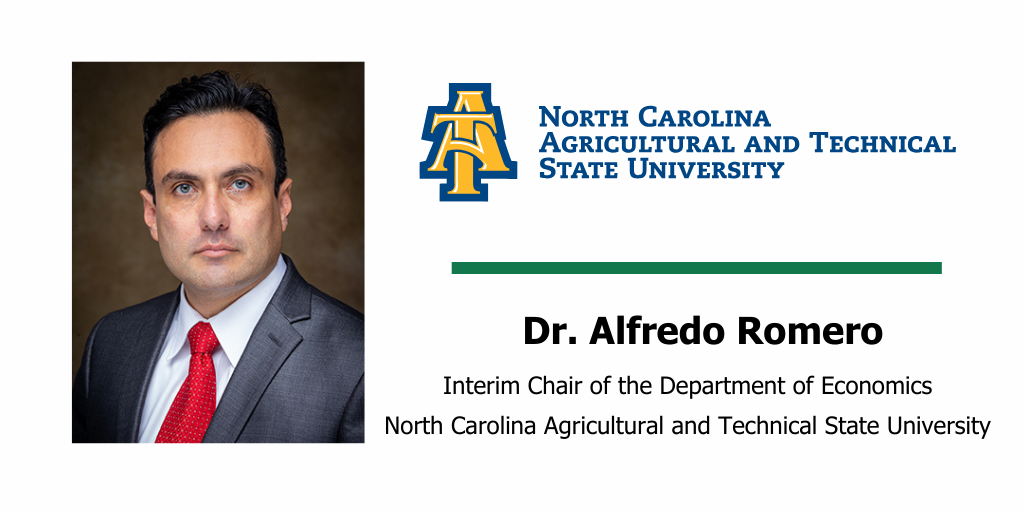Recently, Golden LEAF President, Chief Executive Officer Scott T. Hamilton sat down with Dr. Alfredo Romero, Interim Chair of Economics at North Carolina Agricultural and Technical State University, via Zoom and filmed an episode of Critical Conversations. In this series, Scott talks with professionals about economic development issues affecting the state.
With a robust background and economic analysis and policy development, Dr. Romero previously served as the senior economist for the United States Congress Joint Economic Committee (JEC). As senior economist, he proposed systematic methods to analyze economic problems and develop answers for policy positions.
Scott Hamilton asked Dr. Romero to join him on Critical Conversations to discuss the current economy and 2025 economic outlook.
Dr. Romero provided more information about his background. He has provided consulting, primarily economic impact analysis for major universities and Fortune 500 companies. He has also provided some policy analysis for the Treasury in North Carolina. He added his passion is in teaching economics to the next generation. He has taught at Virginia Tech, the College of William and Mary, and is now teaching and interim chair at NC A&T State University, which is the largest Historically Black College and University (HBCU) in the country. He wants the Department of Economics at A&T to be as impactful as the College of Engineering.
Working for the JEC, shared Dr. Romero, was one of the highlights of his career as an economist. He served for the 118th Congress with the JEC under the leadership of Senator Heinrich from New Mexico. Dr. Romero added that the Joint Economic Committee is to Congress what the Council of Economic Advisors is to the President. He added, the goal of the JEC is to provide insightful and timely information to policymakers. While the JEC looked at the broader view of the country, Dr. Romero shared that North Carolina would often become of interest, especially as it related to rural development and manufacturing.
When it comes to job creation, Dr. Romero believes North Carolina is on track to surpass the number of jobs created in 2024 even with Hurricane Helene. He said that with natural disasters the economy tends to rebound faster than when there are man made disasters like a financial crisis. He added that it is also a testament to the resilience of North Carolina that it is still on pace with its job creation. In terms of forecasting, Dr. Romero said there’s a little bit of uncertainty about what is going to happen in terms of inflation and with tariffs that may or may not be imposed.
The job outlook for 2025 college graduates, according to Dr. Romero, has pros and cons. He said the high tech, highly skilled jobs require a fraction of the jobs that they used to, especially in manufacturing. He added that the community colleges and the colleges and universities have to align courses and training with the skills that these jobs will demand. Dr. Romero said that the high tech, highly skilled jobs will bring about a synergy with new jobs that we have not even thought about. He advises his students to be nimble and learn about as many topics as possible to be able to pivot to the needs of the job. He added that the skills students learn in higher education should be used to think about or pivot to the challenges of the future.
As far as opportunities and challenges with the economy, Dr. Romero shared that the challenges would be the tariff situation and whether and how many tariffs are imposed and what the response of the tariffs from the countries would be as trading partners. Another challenge he added would be inflation. He said the Core Consumer Price Index (CPI) seems to be stuck at 3%. The Core CPI is a narrower measure of inflation that excludes food and energy from the Consumer Price Index because they are more volatile. He said that the Core CPI target level of 2% would not likely be in place until 2026. Dr. Romero added that affordable housing is still an issue. Housing is incredibly important when companies are planning on locating to an area, he added. They look at quality of life and housing availability. In order to attract companies and talent, areas must have affordable housing, he added.
Click here to learn more about Dr. Romero.

